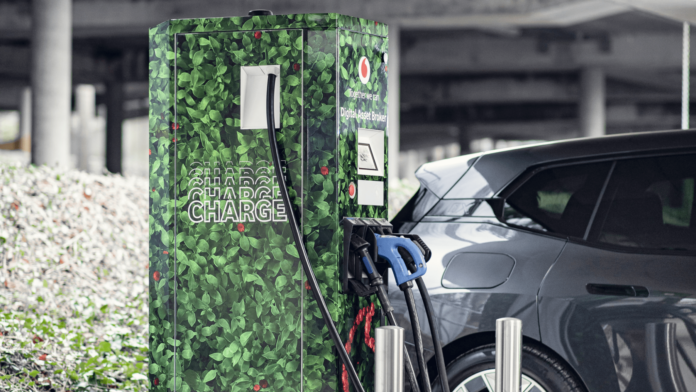MWC, Barcelona: Vodafone has launched a blockchain-based trading platform for IoT devices and sensors. The new Digital Asset Broker (DAB) platform, nominally geared to drive an ‘economy of things’, allows verified connected devices to transact securely without human intervention, but with human (‘owner’) control, the UK-based operator said. Vodafone expects the platform to see usage in the automotive, energy, manufacturing, and supply chain sectors.
A trial is currently underway with an electric vehicle (EV) station in Newbury, near Vodafone’s headquarters in the UK. Financial services company Mastercard and grid decarbonisation not-for-profit Energy Web are also engaged. The trial enables EVs to communicate “autonomously and securely” with the charging point; drivers can authorise the data exchange. Vodafone said the EV use case will eliminate ‘range anxiety’ among drivers.
The system works such that IoT devices are assigned unique digital identities to communicate and transact with other devices using payment technology secured by a mobile SIM. It works with IoT devices already on Vodafone’s network (which claims 140 million IoT and M2M connections); “secure links” to other third-party platforms and device ecosystems will be added through the year, it said.
A statement said: “[DAB] uses the latest blockchain technology… [so] all devices and machines… are verified as trustworthy and then automatically allowed to exchange and trade data and money over secure and encrypted connections. As a result, companies can launch new products that are quickly authenticated as being safe to do business with, no matter where they are, and devices are ready to make real-time financial transactions.”
Vodafone suggested various IoT transaction scenarios, alongside, including: making payments for rental cars and in-vehicle ‘infotainment’ content; payments for smart meter and alarm services; payments “even” for coffee machine refills; authentication of medical supplies and other goods “to weed out fakes”; and data exchanges from smart streetlight platforms about traffic flows and other smart-city diagnostics.
It suggested it is better for businesses in the fragmented IoT sector to use its blockchain platform, as a single platform for IoT trading, than to each develop their own. “[It] solves the problem of most existing connected devices and systems tending to operate in isolation,” it said. The alternative is “costly and time-consuming” system integration every time IoT data is required to be crossed between applications.
Johan Wibergh, chief technology officer at Vodafone, said: “We are building in-house new, scaled platforms for our customers across Europe and Africa. This, our latest platform, will drive the new Economy of Things where everyday objects and devices can negotiate, buy and sell services on our behalf. We are talking with many other companies to rapidly expand partnerships and widen the ecosystem worldwide to include other features and payment schemes.”
Jesse Morris, chief executive of Energy Web Foundation, said: “Electrification is a major part of decarbonization efforts. However, there’s currently no way for EV drivers to ensure all the electricity used to charge vehicles comes from renewable sources. As access to green energy solutions is democratized, this is sorely needed. Working with any on-street EV charger, our solution can give individuals and companies assurance of clean energy use.”

